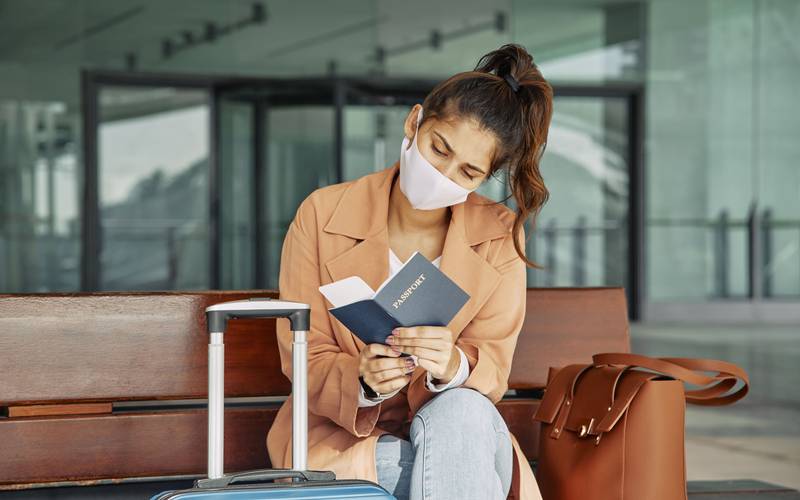A passport not only permits holders to visit countries, it is also a way to measure the rights a person has to live and work in different countries. The list of the most powerful passports has been released for 2021 by Henley Passport Index and Japan is on the top of the list, meaning holders of Japanese passports can easily travel around the world.
Henley and Partners have assessed 199 passports and ranked them according to the number of destinations their holders can access without a visa.
While the Henley Passport Index is usually an accurate indication of a passport’s ability to permit holders to travel between countries, this year the index has not taken into account the temporary border and travel restrictions established due to COVID-19. If we ignore the impact of COVID-19 for a moment, Japan is on top of the leaderboard, with access to 191 countries around the world. Singapore is in second place with visa-free access to 190 destinations, while South Korea and Germany come in third, both with access to 189 destinations.
New Zealand is in the seventh position, with visa-free access to 185 destinations, while Australia is in eighth place with access to 184 countries.
Powerful passports in 2021 (according to Henley Passport Index)
- Japan (191 destinations)
- Singapore (190 destinations)
- South Korea and Germany (189 destinations)
- Italy, Finland, Spain, and Luxembourg (188 destinations)
- Denmark and Austria (187 destinations)
- Sweden, France, Portugal, Netherlands, and Ireland (186 destinations)
- Switzerland, United States, United Kingdom, Norway, Belgium, and New Zealand (185 destinations)
- Australia, Greece, Malta, and Czech Republic (184) destinations
- Canada (183 destinations)
- Hungary (181 destinations)
COVID-19 impact on passport rankings
COVID-19 has impacted everything including passport rankings. The travel landscape has never seen the number of restrictions and bans established due to COVID-19, with borders closed around the world, and mandatory quarantines and negative test results required making it almost impossible to travel to many countries. So how does the coronavirus pandemic impact the real world rankings of passports?
Arton Capital’s Passport Index, another passport ranking index, created their list based on the current coronavirus-related border closures, showing the effect of the actual impact of COVID-19 on passport accessibility.
While Japan is on the top of the Henley Passport Index, the German passport, with visa-free access to 134 destinations, leads on the Arton Capital’s Passport Index, which considers the new visa waivers and the implemented changes around the world. On the Arton Capital’s Passport Index, Japan comes in the fifth position, with a score of 130.
With access to 133 countries, Sweden, Finland, Spain, and New Zealand are positioned in second place, and Denmark, Norway, and Switzerland tie for third place with access to 132 destinations each.
Powerful passports in 2021, with COVID-19 travel restrictions (according to Arton Capital’s Passport Index)
- Germany (134 destinations)
- Sweden, Finland, Spain, and New Zealand (133 destinations)
- Denmark, Norway, and Switzerland (132 destinations)
- Netherlands, France, Portugal, Austria, Luxembourg, Italy, Greece, Ireland, and United Kingdom (131 destinations)
- Belgium, Poland, Lithuania, Hungary, Japan, and South Korea (130 destinations)
- Slovenia, Czech Republic, Estonia, Latvia, and Iceland (129 destinations)
- Australia, Malta, and Slovakia (128 destinations)
- Cyprus and Liechtenstein (127 destinations)
- Croatia and Romania (126 destinations)
- Bulgaria (125 destinations)
Ranking overview
Removing the temporary travel bans, the ranking generates an interesting insight into the future of travel freedom in a world that has been impacted and transformed by the effects of the COVID-19. But it’s important to remember that despite the passport rankings, in the current pandemic times, your passport won’t get you very far if you don’t have residence or a visa, and travel exemption depending on country restrictions.
Although it will likely take years before travel can return to what it was before COVID-19, many efforts have been put in place by governments looking to reopen borders steadily and safely, to resume international travel again.
More digital systems and strategies will continue to be established to facilitate the collection of passengers’ information and tracing contact details accurately to control the spread of the virus. When the vaccination becomes readily available, it is expected that most people will be required to be vaccinated before air travel, and other secure measures will be implemented to increase digital tracking, such as at the initiative that the Australian Government is working on with the new Digital Passenger Declaration (DPD).






